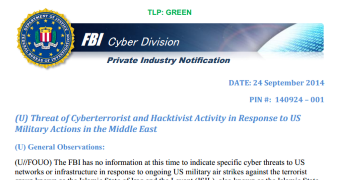As a result of the military actions taken against Iraq and Syria, the FBI notifies of a potential cyber response from the ISIS (Islamic State of Iraq and al-Shams) group and its supporters.
The group is also known as the Islamic State of Iraq and the Levant (ISIL) and the Islamic State (IS).
At the moment, there is no information about hacktivist groups supporting the ISIS ideology preparing for such activity, so the document from the FBI Cyber Division is a cautionary one.
The file is aimed at the private industry and law enforcement and has at its origin intelligence gathered from social media platforms, Twitter included, since the beginning of the year.
The document takes into consideration threats since the beginning of the year
Although the threats are “nonspecific, and probably aspirational,” their iteration has been observed during early September.
“As of early-September 2014, a British media outlet identified the hacker known as Aby Hussain Al Britani as a Syria-based ISIL fighter. Al Britani previously served a six-month sentence in the United Kingdom for hacking the e-mail account of former Prime Minister Tony Blair,” the FBI document says.
Furthermore, the Bureau noticed a tweet from user @Dawlamoon, instigating against Twitter employees, probably because the microblogging company took down several pro-ISIL accounts.
Fear of a cyber-attack under the current military conditions is not unfounded, as hacktivist groups and extremist cyber actors have targeted the websites of US organizations, commercial and governmental, in the past, as a response to military actions in the Middle-East or foreign policies for the region.
FBI provides info on possible attack types and mitigation preparation
The attacks could come under the form of cross-site scripting (XSS), Structured Query Language (SQL) and service disruption through DDoS (distributed denial-of-service) attempts.
The document provides instructions for defending against these types of attacks that could lead to infiltration into sensitive areas of a company or organization in order to exfiltrate information and steal personal details.
Setting up or revising a data backup plan to store the data in secure locations so that it can be easily restored is the first measure on the FBI's list.
DDoS mitigation strategies are also recommended by the FBI, along with implementation of monitoring systems that can record the activity during a potential attack.
Phishing is known to be a powerful tool, especially in targeted attacks that leverage personal information about the victim; as such, having employees capable of detecting a fraudulent email is particularly important.
Apart from these, the Bureau advises using encryption for sensitive data, implementing strong passwords that are changed on a regular basis, employing network monitoring and establishing “a relationship with local law enforcement and participate in IT security information sharing groups for early warnings of threats.”

 14 DAY TRIAL //
14 DAY TRIAL //